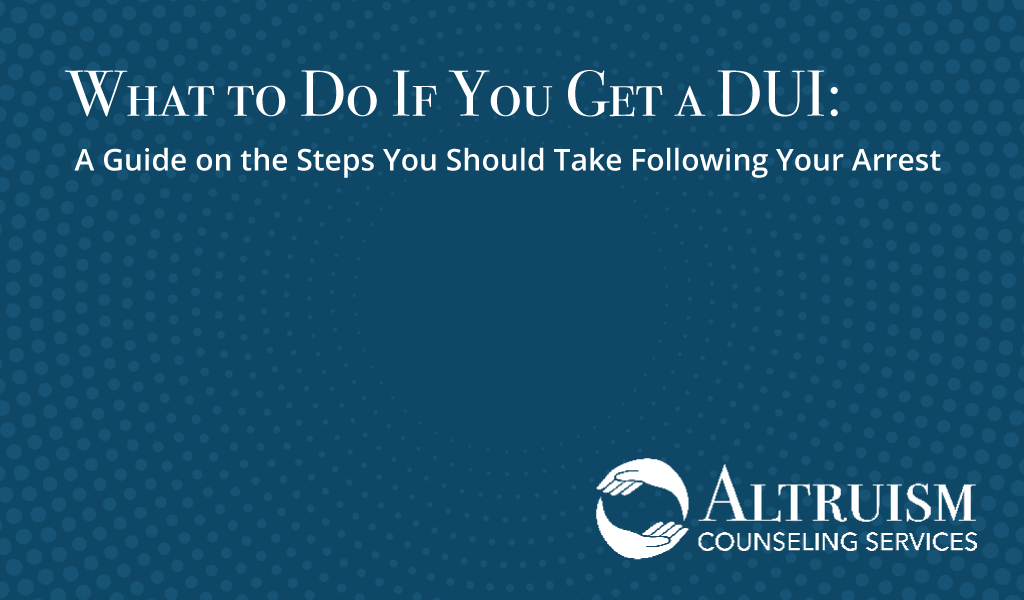
Have you recently been arrested for a DUI for the first time? If you have, you probably have many questions, but understand that you are not the only one who has been through this. In 2021, 17,264 Kentuckians were arrested for a DUI, and for 74.8% of them, it was their first offense in the past 10 years.
Altruism Counseling Services understands this is a terrifying and uncertain experience for many who may question what’s next. We aim to help answer these questions for you. Today, we will discuss one of the most common questions: What to do if you get a DUI?
After a DUI arrest, you will most likely be subjected to a chemical test, especially if you refuse to complete a field sobriety test. You may refuse a field sobriety test in Kentucky. They cannot penalize you for it. Police officers use field sobriety tests to obtain evidence to use against you in court. Still, these tests can be difficult to pass even when you haven’t been drinking alcohol. Instead, know your rights and politely decline to take those tests. Remaining polite and respectful toward the attending officers will help your case, even if you refuse to complete a field sobriety test.
However, suppose the officer has a reason to believe you are under the influence. In that case, you must complete a breath, blood, or urine analysis. Failure to provide those could result in a pretrial suspension of your license.
Whether your vehicle will have to be towed depends on whether the officers associated with your arrest will allow you to have someone pick up the car and if it is in a safe location that will not be a danger to traffic. In Kentucky, it is the police officer’s decision on what happens to the car of someone being arrested for a DUI. The attending officers do not have to allow you to have someone pick it up. If they do, it is essential that the person who is picking up the vehicle has access to the keys and can pick it up quickly. A tow truck will be called if the car stays in one spot too long. This length of time is up to the attending officer.
If your car is impounded, you will have additional fees in addition to those associated with the DUI. You are responsible for the tow fees and the cost of keeping the vehicle in the yard. Your car will remain in the yard until you can pay those fees.
After your arrest, the police officer will take you to the police station, where you will be fingerprinted, photographed, and have personal information recorded. Depending on your circumstances, you must spend a few hours in jail and then be released on bond. When you are released from jail, you will be given paperwork with a court date typically scheduled within 1 to 2 weeks. However, suppose you are not released on bond, typically for repeat offenses. In that case, you will appear in court the next business day.

Immediately after being arrested, remain respectful and remember you have the right to remain silent. You do not need to inform the officer about your plans, whereabouts, or alcohol consumption. The officer is wearing a camera, and if you disclose that information, it will be played for a jury.
It would be best if you also asked for a DUI attorney. This can be one you find on your own or one assigned to you through the state. Your attorney will be able to represent and support you throughout the entire legal process. In addition, take a moment to write down any details you can remember leading up to your arrest. These include where you went, how the drinks were paid for, and who you were with. Any details you can remember, even if they don’t seem necessary, might help your attorney develop your defense.
The arraignment is the pre-trial, also called an initial court appearance. During this hearing, you will hear about the charges brought against you and the sentence you will receive. At this point, you have two options. The first option is to submit a guilty plea. This means you accept the charges and sentence you face, and the judge will set a sentencing date. This sentencing date will be your final day in court.
The second option is to plead not guilty. In this case, you will want to ensure you have a lawyer, as you will then proceed to a trial to defend your case. You can ask for more time to find a lawyer if you do not have one. The judge will establish a court date for you to appear. Keep in mind that this option often requires you to post bail as well as pay lawyer fees.
If you plead not guilty, you have two options for obtaining an attorney: state-appointed or private. A state-appointed attorney is also known as a public defender. Both types are certified lawyers who have passed the bar exam and graduated from accredited law schools. However, key differences exist when deciding which will be best for you. Your unique circumstances will play a role in the best choice.
A public defender is often cheaper or at no cost to the individual if they meet the low-income requirements. This type of lawyer is also not allowed to refuse any client, and they typically handle a range of cases beyond DUIs. Because of this, public defenders cannot often meet with their clients until just before the court takes place. You can also not choose or change your attorney if you select the public defender route.
A private attorney is more expensive and can refuse to represent any client for any reason. However, these lawyers typically specialize in DUI cases, represent fewer clients, and can focus more attention on your case. They will also contact you more and provide a more thorough review. You can choose your private attorney and decide who best represents you and your case. There are many DUI attorneys in the Lexington area, and researching them on Google and interviewing them will give you a better idea of who you should choose.
In Kentucky, there are 2 options when it comes to legal obligations following a DUI arrest. These are based on the offense number you are at within 10 years. The legal obligations increase in severity with each offense you have. For standard DUI penalties in Kentucky, you must take 90 days of DUI classes at an accredited facility, and your license will be suspended for 6 months. For offenses 2 or higher, you must take 1 year of classes. Your 2nd offense includes an 18-month license suspension, 3rd is 36 months, and 4th is 60 months.
However, if you have been violation-free for 90 to 120 consecutive days, depending on your offense, you could qualify for a 2nd option through the Kentucky Ignition Interlock Program (KIIP). This allows for a reduction to your license suspension period. In this program, you must only operate a vehicle with a functioning ignition interlock device. This device will measure your breath alcohol concentration. If it is more than 0.02, it will prevent your vehicle’s ignition from starting and operating.
This option has many violations that could result in your consecutive days starting over. These include:
Complying with all requirements will result in you being required to complete 90 days of DUI classes, have 90 days of violation-free KIIP participation, and a 4-month license suspension for your first offense. Offenses 2 or higher will require 1 year of DUI classes and 120 days of violation-free KIIP participation. With KIIP, your 2nd offense will only have a 12-month license suspension, 3rd offense will be 18 months, and the 4th offense will be 30 months.
Depending on the exact details of your offense, such as traffic violations, endangerment, license or insurance concerns, if a person died, etc., more legal concerns might result in higher fees or jail time. Your lawyer will be able to explain your specific situation in greater detail.
Even after attending DUI classes and complying with your legal obligations, you might still require assistance to leave alcohol behind, especially if you have an alcohol use disorder. This condition makes it difficult to be able to control your intake of this substance, which makes you more likely to have more DUIs in the future.
Attending alcoholism treatment is the best way to find healing and prevent additional DUIs. You will receive the necessary tools, education, and training during treatment to develop a healthier version of yourself.

For many people, receiving a DUI charge allows them to take notice of how much an alcohol use disorder has impacted their lives. Before, they might have believed they could control themselves or even safely drive under the influence. But afterward, a DUI charge or 2 might become the motivating factor for someone to seek treatment. Choosing a compassionate treatment facility that keeps your needs and desires in mind is crucial to your success in finding recovery and being able to avoid DUIs in the future.
Altruism Counseling Services is located in Lexington, KY. We offer accredited DUI classes that will satisfy your legal obligations. In addition to this, we provide psychological assessments for both mental health and substance use disorders, so you have a better chance of recovering and preventing more DUIs on your driving record. Contact us today for more information at 859-310-6505, and find yourself again.